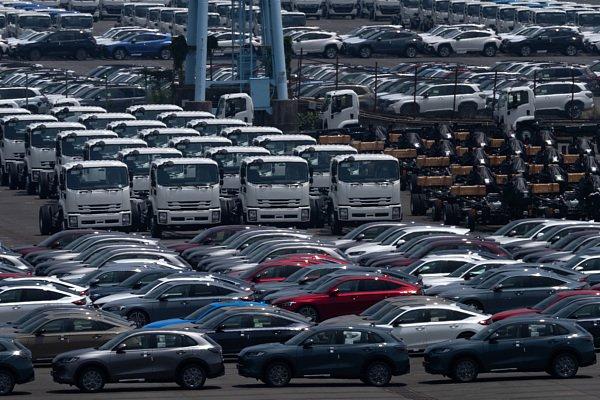
[Reported by Ouanchao Wang, Observation Net] Before the tariff deferral period arrived on July 9th, Japan was hit by a “close ally” with a letter from President Trump raising the tariffs imposed on Japan to 25%, even higher than the rate announced at the beginning of this year.
According to a report by Nikkei Asian Review on July 9th, Trump’s tariff letter shattered Japan’s illusions about the “special relationship” between the two countries. The tone and words in the letter left Japanese officials shocked. Despite Japan’s emphasis during negotiations on its large-scale direct investments and strategic positioning towards the United States, the US side seemed to disregard these concerns.
Analysts remind that Japan must now adapt to the new reality. Although Japan has continuously emphasized alliance relationships, cost-benefit considerations, and grand strategy, the old political economic logic of securing economic concessions through security contributions and political ties seems to be no longer viable. This is most evident in the fact that while Prime Minister Shinzo Abe repeatedly stressed this point, Trump did not engage.
The report also quotes experts saying that Japan may have misjudged the priorities of the Trump administration regarding China. “In matters concerning China, President Trump overwhelmingly focuses on trade and trade deficits,” said Mira Rapp-Hooper, partner at the consulting firm Asia Group and former senior director of East Asia and Oceania Affairs at the U.S. National Security Council. “He is determined to negotiate directly with China for a trade agreement.”
Rapp-Hooper further pointed out that although there might be some officials within the Trump administration who hold an aggressive view towards China, if Trump were to focus intensely on trade negotiations with China and high-level diplomatic exchanges as a means to reduce the trade deficit, then the operational space for other voices and other plans would significantly diminish.
In fact, as early as the end of May this year, a Japanese source involved in the negotiations with the United States and Japan had told Nikkei Asia that “the progress of the Sino-US and US-UK negotiations is faster than expected. The Sino-US (negotiations) are currently likely to be the priority.” The report mentioned that the Japanese side was concerned that if China became the top priority for the US negotiations, Tokyo might be left out of the limited negotiation schedule.
In April this year, the Japanese negotiator, Yoshihiro Noda, went to meet with Trump at the White House.
Nikkei Asia pointed out that immediately after Trump announced the so-called “equal tariffs” on April 2nd this year, he initiated the negotiation process with various countries, with Japan being the first to be hit. In mid-April, Yoshihiro Noda, Japan’s Minister for Economic Revitalization and Chief Trade Negotiator, met with Trump in the Oval Office of the White House and was photographed wearing a red hat signed by Trump, bearing the words “Let America Be Great Again.” It seemed that the situation was optimistic.
However, on July 7th local time, Trump successively announced new tariff rates for several countries, leading to Japan and South Korea being hit first, with tariffs of 25% imposed. Among them, the tariff rate for South Korea remained consistent with those announced at the beginning of April, while the tariff rate for Japan even increased by one percentage point. Foreign media generally interpreted this as Trump’s latest move to pressure Japan and South Korea further, also aimed at showing other countries what he wants.
The report noted that on July 2nd, Japanese Prime Minister Shinzo Abe still insisted that Japan would receive a different treatment from the US. “Japan is the world’s largest investor in the US, creating the most job opportunities,” Abe said during a debate held at the Japanese Club on the eve of the Senate election on July 20th: “Our situation is different from others.”
However, analysts believe that Japan now must adapt to the new reality.
“日本坚持一系列关于同盟关系、成本收益考量和大战略的假设,这些假设不再完全适用吗。”亚洲协会政策研究所(ASPI)中国分析中心的研究员莉兹·李(Lizzi Lee)表示。
“几十年来,日本的战略态势建立在这样一种理念之上,其作为美国在亚洲最可靠盟友的角色,加上其在美国庞大的外国直接投资足迹以及其在台海问题上的重要地位,将保护其免受贸易施压。”
她补充说:“如今的形势表明,这些假设正在经受现实检验。旧的政治和经济逻辑,即安全贡献和政治结盟能够为你带来经济上的宽容,如今似乎没有那么重要了。”
2025年7月7日,日本横滨,港口停放着等待装运的本田汽车和五十铃卡车。
布鲁金斯学会的菲利普·奈特日本研究讲席教授米雷娅·索利斯(Mireya Solis)表示:“美日‘特殊关系’能否持续,正在经受考验。”她将美日关系与美英关系相提并论,后者长期以来被视为美国最亲密的盟友关系。
“石破茂坚称,日本作为主要投资者和‘印太地区’安全领域不可或缺的合作伙伴,为美国经济做出了非凡贡献,因此这一点应该体现在谈判条款中,但特朗普总统一直没有发出这样的信号。”她说道。
美国史汀生中心日本项目主任辰巳由纪(Yuki Tatsumi)分析称,特朗普政府可能已认定石破茂立场摇摆,在参议院选举前缺乏保护他的动力。她表示:“美方可能认为,无论参议院选举结果如何,日本都不太可能出现强有力的领导人。
“Wendy Cutler, Deputy Director of the Asia-Pacific Institute for Policy Studies at the American Enterprise Institute, expressed disappointment with President Trump’s tariff increases on Japan and South Korea, but still sees opportunities for breakthrough through negotiations. ‘While this news is disappointing, it does not mean everything is set in stone.’
‘The only comfort is that this is just a letter, not yet fully implemented tariffs. There is still a chance to reach a negotiation solution before August 1st.’ Matthew Goodman, Director of the Green Economy Research Center at the American Foreign Relations Committee, mentioned that Trump chose to postpone the implementation of tariffs on July 9th partly due to avoiding a sharp financial reaction. ‘Once such financial turmoil occurs, many American companies and their supporters would be very unhappy.’
According to a report by Tokyo’s NHK, the Japanese government convened a comprehensive countermeasures meeting on July 8th regarding the US tariff measures, discussing response strategies. Shigeru Ishiba responded to the US measures during the meeting.
Shigeru Ishiba stated, ‘We are very sorry to hear that the US has announced tariff increases… The Japanese government did not easily compromise in the difficult negotiation process, expressing its demands that should be protected, safeguarding what should be safeguarded.’ He also mentioned that the effective date of tariffs is August 1st, which means the negotiation period has been extended, and negotiations will continue with the United States.”